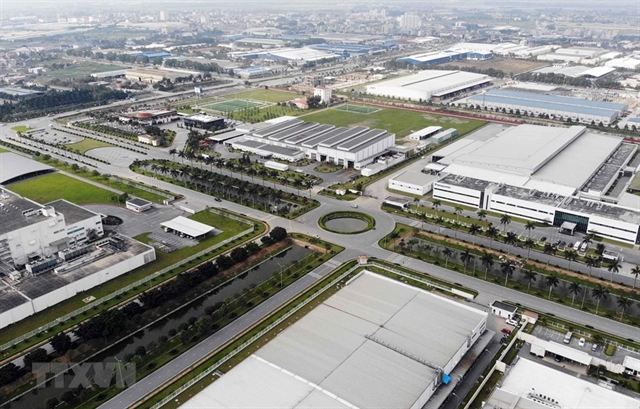The supply of industrial property in the South is expected to rise further in the next five years to capitalise on the increasing demand in the region, and further strengthen its leading position in terms of supply,.

The supply of industrial property in the South is expected to rise further in the next five years to capitalise on the increasing demand in the region, and further strengthen its leading position in terms of supply, according to JLL Vietnam.
The provincial governments have shown further plans to establish new IPs of roughly 23,400 ha in the future, which are all in notable markets surrounding HCM City. The ready-built factory market was also buoyant, with the expected new launch of roughly 897,000 sq.m of ready-built factories by the end of 2021.
Nguyen Hong Van, JLL Vietnam’s Director of Markets, said since technology conglomerates continue to eye Viet Nam for production relocation, the demand for industrial land and ready-built factory remains vibrant.
To lure foreign investments, localities in the Northern area have shown strong commitment to promote IPs, with roughly 10,500 ha of additional supply in the future, she said.
In addition to existing markets, second-tier provinces like Hung Yen, Hai Duong or further North of Ha Noi like Bac Giang and Vinh Phuc are emerging as potential destinations for foreign investors, fostering the rents in those areas to speed up at an expected year-on-year growth of about 8-10 per cent.
The ready-built factory market remains upbeat, with the expected new launch of roughly 332,000 sq.m of ready-built factories by the end of 2021, predominantly in Hai Phong and Bac Ninh.
According to JLL Vietnam’s quarterly report on Viet Nam’s property market in the first quarter of this year unveiled on Thursday, Dong Nai and Binh Duong accounted for the biggest supply of both industrial land and ready-built factory sectors on the property market in the first quarter of this year.
The other localities still have a long journey to catch up to Binh Duong and Dong Nai’s industrial park supply as these two are the oldest-developed industrial markets. Whilst in terms of ready-built factory supply, Dong Nai overwhelmed other provinces due to its well-developed industrial base and sufficient land bank for ready-built factory developers to penetrate, Van said.
However, the report said that no new supply of either industrial parks or ready-built factories was launched in the market in the quarter, she said.
Industrial properties in the Southern area remained significantly desirable for manufacturers to penetrate, although the pandemic still posed difficulties. Keeping the healthy demand momentum, both industrial land and ready-built factories recorded high occupancy rates at nearly 86 per cent and 82 per cent, increasing 0.60 per cent and 0.76 per cent compared to the fourth quarter of 2020, respectively. Of which, industrial land recorded transactions which have been negotiated since last year, whilst ready-built factories witnessed new leasing expansions of existing tenants rather than newcomers.
Industrial land remained the hottest sector for either newcomers or to meet the manufacturing expansion needs of existing investors, backed by Viet Nam’s strong manufacturing fundamentals, Van said.
Therefore, most industrial park developers in Southern markets still maintained strong momentum to raise land prices reaching a new high at US$111 per sq.m per lease term, up 8.1 per cent year on year in the first quarter of this year. Whereas ready-built factory rents averaged $4.5 per sq.m per month across the region, increasing 3.1 per cent year on year, driven by the healthy demands of small and medium-sized enterprises as they expanded operations.
According to JLL Vietnam, in the first quarter, no new supply in industrial land and ready-built factories were introduced in the Northern market. The cumulative leasable land area in the market achieved roughly 9,500 ha, while the total supply of ready-built factories stood at approximately 1.8 million sq.m.
Bac Ninh and Hai Phong dominated the total supply in both sectors thanks to their strategic locations, strong footprints in the industrial market and improving business environment.
The third wave of COVID-19 swept the Northern area in late January has led to the postponement of new investments in the region, especially the lockdown in Hai Duong freezing most of the transactions in industrial parks in the first quarter.
Nevertheless, thanks to the strong influx of FDI in high-tech industries starting in the second half of 2020, the average occupancy rate of industrial parks recorded a healthy rate, reaching 75 per cent, whereas the occupancy rate of ready-built factories stood at 98 per cent in the quarter.
Given healthy demand, backed by Viet Nam's strong industrial fundamentals and combined with industrial park developers’ strong confidence in potential long-term investments, the land price continued its momentum to reach a new peak of $107 per sq.m per lease term in the first quarter, up 8.1 per cent year on year.
Meanwhile, ready-built factory rents also showed an increasing trend, at 5.8 per cent year on year, of which Bac Ninh recorded the strongest growth rate of nearly 9 per cent year on year fuelled by the launch of high-quality ready-built factories. — VNS





